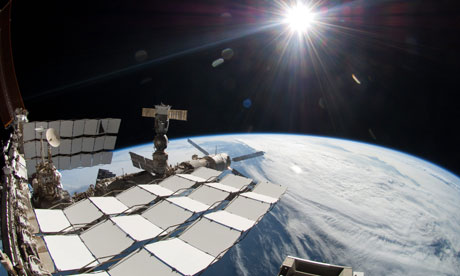 After more than 15 years of failures by scientists around the world and one outright fraud, biologists have finally created human stem cells by the same technique that produced Dolly the cloned sheep in 1996: They transplanted genetic material from an adult cell into an egg whose own DNA had been removed.
After more than 15 years of failures by scientists around the world and one outright fraud, biologists have finally created human stem cells by the same technique that produced Dolly the cloned sheep in 1996: They transplanted genetic material from an adult cell into an egg whose own DNA had been removed.
The result is a harvest of human embryonic stem cells, the seemingly magic cells capable of morphing into any of the 200-plus kinds that make up a person.
Scientists successfully create human stem cells through cloning
What's a monster hurricane doing on top of Saturn?
 NASA's Cassini spacecraft has captured images of a monster hurricane at Saturn's north pole – a storm so vast and powerful it makes tropical cyclones on Earth look tame by comparison.
NASA's Cassini spacecraft has captured images of a monster hurricane at Saturn's north pole – a storm so vast and powerful it makes tropical cyclones on Earth look tame by comparison.
The storm's eye alone spans some 1,250 miles – about the distance from North Carolina's Outer Banks to central Kansas. Wind speeds at the inner eye wall have been clocked at 330 miles an hour. The storm extends for another 600 to 700 miles beyond the eye.
Kepler Telescope Spots 3 New Planets In The 'Goldilocks Zone'
Astronomers have found three planets orbiting far-off stars that are close to Earth-sized and in the "habitable zone": a distance from their suns that makes the planets' surfaces neither too hot nor too cold, but just right.
One of the three planets orbits a star with the prosaic name Kepler-69. "Kepler-69 is a sun-like star," says , a research scientist at the Bay Area Environmental Research Institute who uses the , which is on a mission to search for Earth-like planets.
Super-powered battery breakthrough claimed by US team
 A new type of battery has been developed that, its creators say, could revolutionise the way we power consumer electronics and vehicles.
A new type of battery has been developed that, its creators say, could revolutionise the way we power consumer electronics and vehicles.
The University of Illinois team says its use of 3D-electrodes allows it to build "microbatteries" that are many times smaller than commercially available options, or the same size and many times more powerful.
It adds they can be recharged 1,000 times faster than competing tech. However, safety issues still remain.
Smart bracelet protects civil rights and aid workers
 A hi-tech bracelet could soon be helping civil rights and aid workers at risk of being kidnapped or killed. When triggered, the personal alarm uses phone and sat-nav technology to warn that its wearer is in danger.
A hi-tech bracelet could soon be helping civil rights and aid workers at risk of being kidnapped or killed. When triggered, the personal alarm uses phone and sat-nav technology to warn that its wearer is in danger.
Warnings are sent in the form of messages to Facebook and Twitter to rally support and ensure people do not disappear without trace.
The first bracelets are being given out this week and funding is being sought to make many more.
Strong hints of dark matter detected by space station, physicists say
 Physicists announced on Wednesday that they have discovered the most convincing evidence yet of the existence of dark matter – the particles that are thought to make up a quarter of the universe but whose presence has never been confirmed.
Physicists announced on Wednesday that they have discovered the most convincing evidence yet of the existence of dark matter – the particles that are thought to make up a quarter of the universe but whose presence has never been confirmed.
Members of an international team gathered at Nasa in Washington and Cern in Switzerland to report their findings, which come from a $2bn particle detector mounted to the International Space Station.
World's lightest material created
 Chinese scientists say they have developed the world's lightest material, lighter than air, which could play an important role in tackling pollution.
Chinese scientists say they have developed the world's lightest material, lighter than air, which could play an important role in tackling pollution.
The material dubbed graphene aerogel or carbon aerogel, developed at Zhejiang University in Hangzhou, weighs just 0.16 milligrams per cubic centimeter, a sixth that of air, China's state-run Xinhua News Agency reported Friday.
The material, derived from a gel with the liquid component replaced by a gas, is easy to manufacture and has strong oil-absorption properties, its developer says.
More Articles...
Page 26 of 61

 Science Glance
Science Glance






























